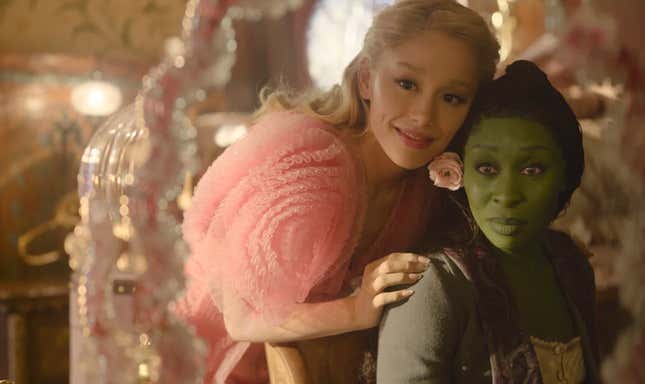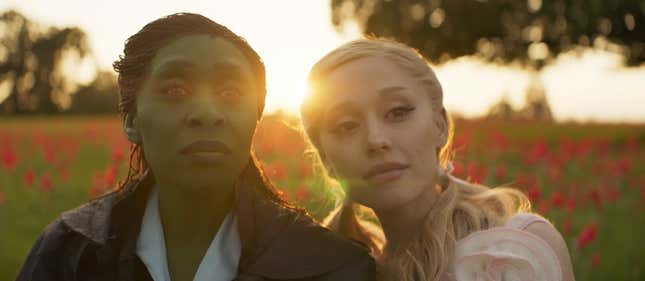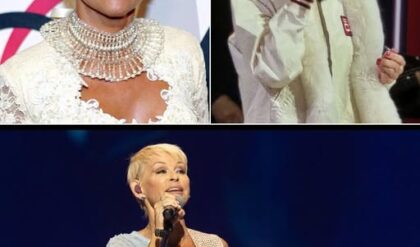While Cynthia Erivo and Ariana Grande nail their respective characters, there’s a bigger message behind their dynamic that needs to be talked about.

As “Wicked,” starring Cynthia Erivo and Ariana Grande, continues to fly to the top of the box office, there’s a lot of positive chatter about the film and their respective characters. But there’s one element of their dynamic that keeps getting overlooked that it’s time for us to talk about.
For context, the film—which is a movie musical adaptation of the Broadway production of the same name—explores the history and relationship between Galinda/Glinda the Good Witch (Grande) and Elphaba, the Wicked Witch of the West (Erivo) in the land of Oz. When the film first begins, the two women are at odds as Glinda is the popular, socially privileged person whereas Elphaba—thanks to her green skin and her affinity to consistently fight for what’s right as opposed to sticking to the status quo—is not.
Eventually, the two women come to be fond of each other and accept the other’s differences which left many viewers feeling like they needed to find “the Glinda to my Elphaba” in the aftermath. But that whole notion erases a major point about the two character’s relationship: Glinda isn’t a good friend to Elphaba. Like, at all. In fact, the relationship between the two women are actually a good representation of the self-serving relationship some white women have with Black women—and here’s how.

Cynthia Erivo as Elphaba, left; Ariana Grande as Galinda/Glinda.
Photo: Universal Studios
Though Elphaba is green, she’s being played by a Black woman which inherently makes the discrimination and mistreatment she endures based off the color of her skin that much more visceral for Black women who are watching. So when Glinda, who’s used to being looked at as the beacon of all things right, is heralded for embracing Elphaba and sticking up for her—even though she plays a major part in Elphaba being mistreated in the first place—it feels unfortunately familiar for those same Black women who have had the same experience. Much like Glinda, for some white women, they like to display their “goodness” to Black women (and people) through performative, self-serving gestures to try to “solve” a problem all while conveniently ignoring the role they played in creating the problem to begin with.
This point can be proven in the film where—spoiler alert—Elphaba arrives at a club and is immediately and severely made fun of because of a hat she’s wearing. This forces Elphaba to embrace being an outcast and she decides to further alienate herself by dancing alone in the middle of the floor. After seeing how wrong everybody is, Glinda goes to dance with her and soothes her which eventually signals to others that the Elphaba should be accepted.
The problem? Glinda was the one who gave her the hat in the first place under the guise of “helping” and told her it would make her look cool and that she should wear it to the club. I don’t know where y’all are from but where I’m from that doesn’t make you a “good” friend or a “good” person if you deliberately set someone up to be ridiculed. It makes you fake, stank, and someone to keep an eye on should y’all decide to still be cool moving forward.
Wicked – Official Trailer 2
But sadly, that’s the lived experience for so many Black women and Black people in general when it comes to their relationship with certain white folks. Like Glinda, they’re only good if it makes them look good and will be beneficial to them in the long run. Their goodness is conditional. Their goodness comes with strings attached.
They’re good not because it’s who they are or because it’s the right thing to do—they’re “good” because it upholds their place in society as the arbiter of all things perfect and they know any perceived deviation from that would jeopardize it. Their goodness is for public display, for medals, for accolades, for a reward at the end. Not because it’s truly within them to do so based off some deeply ingrained moral compass.
And before you go “it’s not all white people,” let me be clear: I never said it was. But what I am saying is that there’s been enough white people behaving in that way and enough Black people who can corroborate it to be true for a handful of white people. So while “Wicked” is a phenomenal film (it truly is), let’s not miss the bigger message that behind all the green and pink smoke and mirrors. Black women don’t need a Glinda, they need another Elphaba. And there’s nothing wicked about that.





